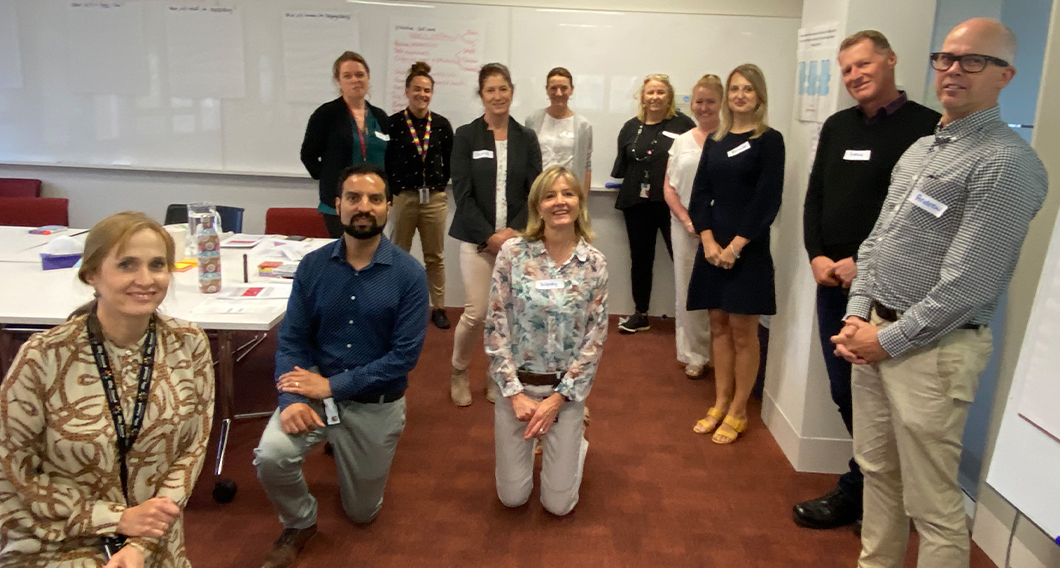Wendy from Macquarie University

Name
Wendy Botha and the Wellbeing Action Group
Job title
Senior Organisation Development Consultant
Organisation
What are you/your organisation currently focusing on in terms of workplace health and wellbeing?
Our key focus areas for 2020/21 are to grow our existing program and annual calendar of events. We want to offer staff ongoing access to a range of health and wellbeing activities and seminars throughout the year. We are also looking at how we can get more involvement and buy-in from our leaders.
Covid has necessitated us to include an online offering which has helped us stay connected with our community and also record our lunchtime talks for future viewing.
What aspect of workplace health and wellbeing does your organisation do well in?
Our wellbeing program is a collaborative effort designed and developed by our Wellbeing Action Group. This group meets four times per year and it is represented by key stakeholders across campus e.g. Sports and Aquatics Centre, MQ Health, Centre for Emotional Health, Health and Safety, Sustainability, Hearing Hub and Human Resources.
We are able to provide a great variety of activities and seminars to staff by utilising our experts on campus which is both cost efficient and it allows us to create an awareness amongst the staff of the great facilities and services that are available to them on campus e.g. staff massages, bush care activities, arboretum walks, mental health workshops and seminars, a variety of health talks and seminars (presented by our Academic, Sport and Hospital staff), mindfulness practises and workshops etc. During the year we also offer staff free flu shots and hearing screening.
Our training calendar supports our wellbeing program and offers courses such as resilience training, mental health training and handling difficult conversations. We have also added a library of LinkedIn learning wellbeing related courses.
Over and above our ongoing monthly program of events we also offer staff an annual Wellbeing Month in September, where we provide staff with a month of activities, seminars, free services (e.g. health checks, free exercise classes etc.), team challenges and some spot prizes. Our wellbeing month has grown from strength to strength and it allows staff an opportunity to focus on their health and set new goals. It has also increased the awareness around health and wellbeing on campus and the feedback from staff has been very positive.
We have had great support from our marketing and communications team which has ensured that we get messages, notices and interesting articles out in a timely manner and ensures participation in the program and ongoing awareness of what is on offer.
What’s your biggest challenge working in workplace health and wellbeing?
We would like to get our leaders more involved in managing the wellbeing of their staff. We hope to provide workshops for managers in the future to educate managers how to bring a wellbeing focus into everything they do and how to lead with a “wellbeing conscience”.
How does WayAhead Workplaces add value to your organisation’s health and wellbeing program?
We find the quarterly events very useful for networking and staying on top of best practise. The WayAhead Workplaces team is very approachable and responsive and have often been a great help when we have required additional information or if we have been looking for a contact. The website is also a great resource.
How do you deal with stress?
Exercise is my “medicine”. I am part of a regular running group and I love to connect with my friends while I run – it helps me manage my stress and is an effective and cheap form of therapy! I also enjoy playing with my kids and our 2-year-old Cavoodle.
Taking walks at lunchtime at work to clear the head also helps and going out with friends and watching movies provides a good break from my day-to-day routines.
What are the key issues and considerations for people in workplace health and wellbeing roles?
Achieving a culture of wellbeing in an organisation takes time and effort. It does not happen overnight. Start with a vision and a few key goals each year and then build on these as you go.
Leadership sponsorship and involvement is critical to the success of your program as well as management training – i.e. think about how you can develop wellbeing conscious leaders.
Most organisations have access to some great resources – try and capitalise on what you have and spend your budget on other initiatives that you have identified as important to your program.
How do you switch off from work?
I work 4 days a week (Monday-Thursday), which allows me to balance my “mom” duties and my work.
When I leave work on a Thursday – I plan my diary for the following week and ensure that any work that still needs to be done goes into the diary for the upcoming week. That way I have been able to train myself to switch off and not worry about outstanding work as I have planned for it to be done when I get back to work on Monday.
What is your best time-saving tip?
Learn to say no and focus on the important things first.
Plan for walking meetings that way you get fresh air and exercise while getting some work done.
What do you think the future of work health and wellness programs look like?
I think health and wellbeing will be integrated into everything we do – from wellbeing friendly workspaces (i.e. healthy food, medical and health services, activity parks and exercise classes, etc.), to wellbeing conscious workers and leaders. Flexible working will become the norm.
Staff will look for jobs at companies where health and wellbeing are a priority and companies that don’t focus on this will not be able to attract high performing staff.